Evey kid starts out as a natural-born scientist, and then we beat it out of them. A few trickle through the system with their wonder and enthusiasm for science intact” – Carl Sagan
Languages; when I started thinking about this I was reading a primer on Latin. I have been fascinated with languages(although poor at learning them) since I started my studies in STS. (STS = science and technology studies or science and technology in society). While not a great insight, I think it is overlooked that if a language doesn’t have a word for an item, it doesn’t exist in that culture. Words I struggled with in STS were ontology and epistemology. And a reminder to those who hate wikipedia; I find it an interesting place to start my research on any topic. It just doesn’t end there.
However, as I thought about it, it isn’t about languages as much as its about formulating questions. How does a language evolve? Words must be created to describe a new thing. What would the word ‘radio’ mean to Socrates? Many questions were asked and answered over the past 2700 (or so) years. In our society, more people will quibble over the number 2700 than will be interested in the question posed.
As many of you know, history was not one of my interests until the aforementioned STS work. It seems to me the history and trajectory of a society can be told in the evolution of the language of a culture and the questions being asked within that culture.
During my short career as a teacher, well, formal career, I found students were often unable to formulate a question. As I look back over my varied careers, I find that is generally the issue; “what problem are we trying to solve, really?” The old saying,”A problem well stated is a problem half solved,” is more than a cute saying. It should be every scientist’s and engineer’s mantra. It is not at all clear to me that all studies start from that position.
It also occurred to me that there are far more answers looking for questions than well stated questions looking for answers.
“The one real object of education is to have a man in the condition of continually asking questions.” — attributed to Bishop Mandell Creighton, a British historian who lived 1843-1901.
